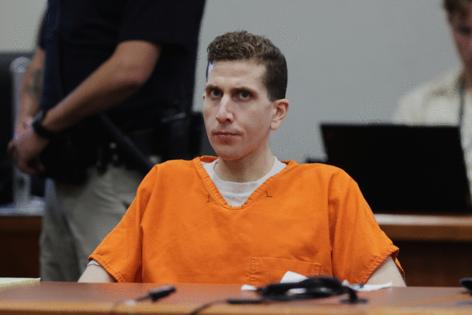No ability to pay: Kohberger's Idaho defense fends off more victim restitution
Published in News & Features
BOISE, Idaho — Bryan Kohberger, the man serving life in prison for killing four University of Idaho students, received at least $10,000 in donations while he was in custody awaiting his murder trial, and seeks to avoid paying any future funds to the victims’ families.
Attorneys for Kohberger and the state appeared virtually in front of 4th Judicial District Judge Steven Hippler on Wednesday morning to argue over how much restitution he should be forced to pay. The 20-minute hearing was the first in the closely watched case since Hippler sentenced Kohberger to four consecutive life terms plus $300,000 more than three months ago.
Kohberger, who turns 31 this month, is incarcerated at the state’s maximum security prison south of Boise. He was not at Wednesday’s hearing, with his three-member defense team appearing in his place.
In a deal to plead guilty, which removed the possibility of the death penalty and prevented a trial, Kohberger already agreed to pay nearly $29,000 to two of the victims’ families and Idaho’s crime victim’s fund. But his defense argued he shouldn’t be on the hook for additional restitution for the other two victims’ families.
The majority of the state’s request for about $27,000 more on their behalf doesn’t qualify under Idaho law, Kohberger’s defense told Hippler on Wednesday. The added costs are also beyond the scope of the plea agreement and came more than 60 days after their client was sentenced. As someone in prison, Kohberger also lacks the ability to pay, his attorneys argued.
The four victims were University of Idaho undergraduates Kaylee Goncalves and Madison Mogen, both 21, and Xana Kernodle and Ethan Chapin, both 20. All four were stabbed to death at an off-campus home in Moscow in November 2022. The three-year mark of their murders arrives next week.
The court previously found Kohberger to be indigent — meaning he could not afford to cover the expense of an attorney — so he was provided a defense team at public cost for his case. His pretrial process lasted more than 2 1/2 years before it concluded with the plea agreement.
Kohberger did receive “lump sums” to his account while in custody on charges of murder, but his circumstances in prison are “drastically different” today compared to before the plea agreement, defense attorney Elisa Massoth argued. Those contributions also were “primarily family” to stay in communication ahead of his trial, she said.
“We are arguing that he does not have an ability to pay,” Massoth told the court. “There’s no way that Mr. Kohberger is ever going to profit from any sort of movie or book because Idaho code ... specifically precludes that.”
Hippler pushed back about alternative ways Kohberger could receive contributions in prison down the road, including from family — as well as members of the public. Records showed Kohberger received payments in the “five figures” while in jail, he said. The exact amount and the source of the donations were filed under seal.
“It seems to me one of the best indicators of the future is the past,” Hippler said. “Going forward, I’m not aware of his family having disowned him at this point and not wanting any contact with him.”
The unique nature of the high-profile case, which garnered worldwide attention, also could lend itself to moneymaking opportunities for those associated with it, Hippler said.
“What harm is it to order the restitution, which would then sort of jump in line in terms of priority of payments over some of the other ordered payments?” he asked. “What’s the downside to ensuring that the victims are as whole as possible?”
Massoth labeled what donations Kohberger may receive in the future as “pure speculation.”
‘Is it really about money?’
At the hearing, Latah County Prosecutor Bill Thompson, who led the state’s case against Kohberger, acknowledged that some of the additional restitution the state requested does not meet the requirements of Idaho law. Thompson revised his position Wednesday to asking for a total of about $3,100 more, because reimbursements for the families’ expenses for hotels and travel to Boise do not qualify.
“I now know that’s not correct, and it was certainly my mistake,” he told the court.
The families of Goncalves and Mogen spent a combined $3,100 on urns. The defense and prosecution agreed those costs fall under the definition of funeral expenses, as identified in the plea deal.
“Why should you not be held to the plea agreement to pay the victims the costs of interning their children?” Hippler asked the defense. Fellow defense attorneys Anne Taylor and Bicka Barlow also attended the hearing.
Massoth agreed those costs would qualify, but then reiterated her point that her client has no ability to pay — including the prior $29,000 in restitution. The new request failed to meet a required deadline, she added.
The Goncalves family has vented frustration over Kohberger’s refusal of further restitution.
“Is it really about money?” Kristi Goncalves, mother of Kaylee Goncalves, recently told The Interview Room podcast. “Everybody knows he’s never going to pay a single dime, so why do they care if that’s like the most astronomical number in the world? ... But it’s just that control — denying our restitution — wanting to argue and fight over that.”
Hippler did not rule on the matter from the bench Wednesday. He said he would issue his decision in “due course.”
_____
©2025 The Idaho Statesman. Visit idahostatesman.com. Distributed by Tribune Content Agency, LLC.







Comments